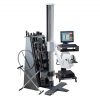
5 Ways Outcome Tracking is Essential to Your Therapy Practice
Practice ManagementWhen negotiating reimbursement rates and considering treatment plan approval, insurance companies refer to their own statistics as a guide. Bringing your data levels playing field, offering the leverage needed to negotiate for your patient. Outcomes tracking can help you advocate for your patient and show the value of treatment.
Historically, PT and OT clinics have relied solely on individual patient improvement to establish and prove their value to patients and insurance companies, alike. Success was measured through patients’ end results, but didn’t assess the effectiveness of the individual activities and treatments, as they were occurring. With the rise of technology, however, organizations now have the resources to collect and analyze actionable data. The value garnered from analyzing patient results, referred to as outcome tracking, is then passed on to patients, healthcare providers, and payers across the country.
You might be wondering – what exactly is outcome tracking and how can your clinic benefit from implementing this strategy? Outcome tracking measures the impact a treatment plan has on each patient. Taking into account key factors such as age, weight, sex, height, and overall health into account, collected data helps therapists identify trends, determine cost of care, and measure patient satisfaction on a deeper level. In short, it starts with the end result, and builds from there.
Aside from fostering quality patient care, there are a number of reasons outcomes tracking is critical in our current healthcare landscape.
1) Provide Insurance Companies with Actionable Data
Now, more than ever, the healthcare industry’s focus is on providing patients with the best possible care, while reducing costs. When negotiating reimbursement rates and considering treatment plan approval, insurance companies refer to their own collected statistics as a guide. Bringing your collected outcome data to the table ensures a level playing field, offering the leverage needed to negotiate for your patient.
2) Improves Quality of Patient Care
For a well-rounded outcomes analysis, clinics must include patient feedback and outcome surveys in their processes. This offers insight into which treatment plans are the most effective, accounting for specifics regarding each individual’s health. As a result, clinics can boost best practices, treatment strategies, and patient-specific care, ensuring an exceptional outcome for every patient.
3) Position Clinic as Leader in the Industry
Given the information-rich society we live in, it’s critical that practitioners establish themselves as leaders in their industry to realize long-term success. Outcome tracking strengthens this process on multiple levels:
Increases referral numbers – By providing patient outcomes data to referring physicians, you elevate their level of confidence in you. This, combined with sharing information with physicians you don’t currently have a relationship with, builds long-term relationships and further boosts your referral base. The patient’s overall care is improved, particularly for those who see multiple specialists for their chronic condition.
Bolsters consumer confidence – In reaction to the level of information available to us, consumers are taking a more active role in their healthcare. Patients conduct their own research, striving to partner with the practitioner they believe will meet their needs. As part of their marketing efforts, clinics should turn their outcomes data into case studies that will help build their reputation both on an individual and organizational level.
4) Improves Organizational Efficiency
Business tools have evolved by tremendously over the last decade. As a result, there is a growing consciousness that data measuring offers companies the evidence needed to identify which processes are working and which ones should be abandoned or replaced. Once short and long-term goals have been clearly outlined, outcomes data is used to assist in making decisions to enhance operational efficiency. Management can track progress towards goals on an individual, departmental, and organizational level, revealing where it currently stands, compared to where it wants to be.
5) Helps Define and Improve Industry Standards
When combined with collected data spanning the entire industry, everyone stands to benefit from analyzing the trends, fluctuations, and consistencies. Industry standards, regarding treatment plans, are better defined. Procedures are enhanced and properly aligned with patient needs. As a result, patient care is elevated across the country.
While outcome tracking stands to enhance business and elevate patient care, your results are only as good as the data you collect. Carefully consider what outcomes require measuring and why. What are the overall goals and what are the mileposts to measure progress? This will help you design a survey that is well thought-out and concise, drawing out actionable data. Make sure your patients understand the value of their answers and feel secure enough to answer each question open and honestly. The end result? Patients receive a higher level of care and companies increase their overall investments and bottom line. See how data driven analytics can improve your business today.





